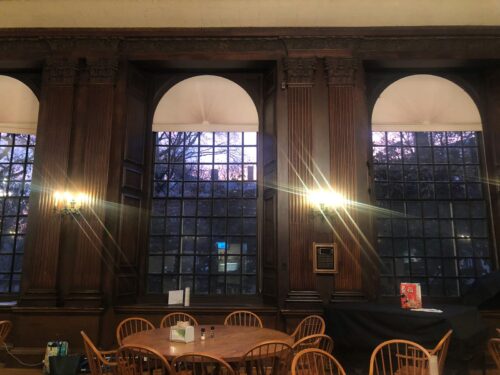Feed a Cold and Starve a Fever
HUDS’s internal communication breaks down as dining halls adjust to an emptier campus
By MICHAEL KIELSTRA
Every day, Harvard University Dining Services (HUDS) serves three meals to the vast majority of students on campus, as well as plenty of professors and staff and, sometimes, Dean Khurana. They estimate serving approximately 22,000 meals daily. When the announcement was made on Tuesday, March 10 that undergraduates must move off-campus by Sunday, March 15, employees at HUDS were not fully informed whether they would continue to have compensation despite the drastic reduction of the student body. Over the course of Thursday and Friday, March 12 and 13, the Independent asked HUDS employees and management what they knew of the status of their employment. We found a strange dichotomy: HUDS management had contingency plans in place, and had known for some time how they were going to respond to the COVID-19 outbreak, but had often failed to communicate these plans to lower-tier workers.
At one river House, on Friday, March 13, I spoke to the checker at the swipe-in desk. Her emotions tended toward the weary and fatalistic as she confirmed that she was working this week, working next week, and, after that, she would take things “Day by day.” She did not know if or when she would be laid off, and she did not know when she would know. Although there was no one queuing behind me, she emphasized repeatedly how busy she was and how she was not supposed to talk to journalists. This was not a topic she wanted to discuss at length. The day before, Thursday March 14, another checker had told me that she did not even know this much, and that management were apparently in meetings to decide who would be retained and who would be let go.
A chef in the same house, resplendent in white coat and hat, told me that same day that he had nothing to worry about. “Everyone at HUDS,” he confirmed, “still has a job.” Most of these jobs center around those dining halls which are being kept open to feed staff and those students still on campus, and people are being moved around, or, in HUDS parlance, “re-tasked,” in order to keep them all employed. The chef gave the example of dishwashers, who are mostly obsolete now that the university has moved to paper plates and plastic cutlery in light of the University’s commitment to maintaining sanitation standards. Many of them, he said, will be moved to front-of-house work such as swiping cards. HUDS was to remain ready to serve faculty, staff, and those students remaining on campus, and everyone could join in. Over a distance of ten feet or so, the amount of information available, and the mood, had shifted drastically.
Harvard continued to send out messages regarding the HUDS budget after the student move-out. On Tuesday March 17, Mike Burke confirmed in an email that those students who were not staying were refunded up to $3377.50 for the board that they would no longer be on campus to eat. On Thursday March 19, the university committed to continuing HUDS workers’ pay for at least thirty days.
Poor communication did not only extend to confusion over working hours and salary. On Saturday, March 14, College dining halls moved from a buffet-style service to a system where HUDS workers would serve students individually, thereby keeping students from accidentally contaminating pots of food. A chef confirmed with me that switching to this style had been the plan for well before Larry Bacow’s March 13 email confirming that a Harvard affiliate had contracted COVID-19, and that the unfortunate coincidence of these events falling two days apart was just that. The switch was also motivated in the main by cleanliness and safety, although the increased number of positions for workers was “a nice extra.” A checker, on the other hand, told me that she had only been told about the new service style on the afternoon of the 13th. The same presumably goes for the workers doing the serving, dressed as they were in checkers’ uniforms and not chefs’.
It turns out that many HUDS workers I talked to declined to speak even anonymously, and all the ones who did speak emphasized that they did not want to be named. One of them did give me his name, but came chasing after me a moment later to ask that I “do [him] a solid” and not print it, since he was not supposed to talk to the press. With this in mind, we have not named anyone who spoke to us for this piece.
Jason Newton, a university spokesperson, sent the Independent a statement saying that “The economic impact of this rapidly evolving public health crisis is one that is hitting employers of all sizes, not just higher education institutions. Harvard has taken steps to reduce the population living and working on campus, as a way to lower the risk of exposure to COVID-19 for every member of the University’s community. This step was taken with Harvard’s top priority in mind—the safety and wellbeing of our faculty, staff and students.
“For Harvard’s own dining services employees whose work is eliminated or reduced due to this step to lower the campus population, the University has committed to continue pay for 30 days. The University will continue to review and assess its human resources policies, including those related to compensation, as this public health crisis and its economic impact continues to evolve.”
Michael Kielstra ’22 (pmkielstra@college.harvard.edu) has—full disclosure—eaten a lot of HUDS food.

